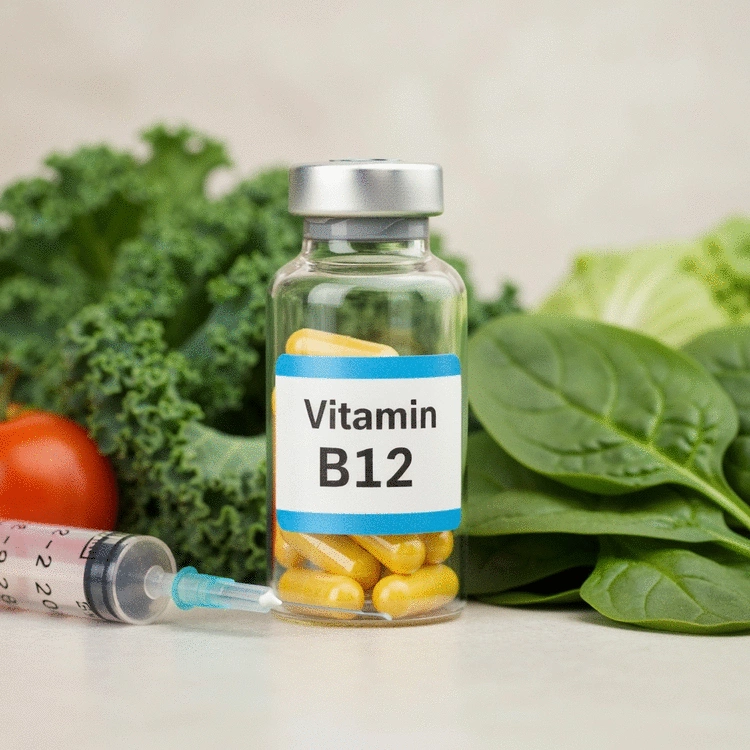As we consider the impact of vitamin B12 on our health, it's essential to remain vigilant about both deficiency and excess. What if the very nutrient believed to safeguard our well-being could also pose risks? This exploration reveals the critical balance necessary for optimal health.
What You Will Learn
- Vitamin B12 is vital for blood cell production, nerve function, and DNA synthesis.
- Deficiencies are increasingly common, especially among those on vegan diets or with certain health conditions.
- Excessive intake of vitamin B12 can lead to toxicity, presenting symptoms such as liver damage and neurological issues.
- Consulting a healthcare professional is crucial to determine safe levels of vitamin B12 intake based on individual health needs.
- Understanding the differences between cobalamin variants (methylcobalamin vs. cyanocobalamin) can guide effective supplementation.
- Monitoring symptoms and scheduling regular check-ups are essential for maintaining balanced vitamin B12 levels.
Vitamin B12 Intake & Risks: A Quick Guide
This visual summarizes key information regarding Vitamin B12 intake, recommended dosages, and potential risks associated with excess, structured to provide a clear overview.
B12 Importance & Key Roles
- Essential for nerve function & cognitive health
- Crucial for red blood cell formation
- Supports DNA synthesis & cellular metabolism
*Adequate intake vital; deficiency becoming more common.
Recommended Intake & Risks
- RDA (Adults): 2.4 micrograms
- Upper Limit: None established (monitor excess)
- Toxicity Symptoms: Liver damage, heart palpitations, nerve pain
*Consult healthcare professional for significant changes.
Monitoring B12 Levels
- Track intake via food diary
- Note changes in health/symptoms
- Regular check-ups & blood tests
*Awareness is a significant part of health management.
Professional Guidance & Tests
- Consult for personalized advice
- Blood tests diagnose deficiency/excess
- Intrinsic factor role in absorption
*Essential for long-term wellness decisions.
Understanding the Potential Dangers of Vitamin B12
Vitamin B12, also known as cobalamin, plays a crucial role in our bodies. It’s essential for blood cell production, the proper functioning of our nervous system, and even for DNA synthesis. Without adequate B12, our bodies can struggle to create healthy red blood cells, leading to anemia and other serious health issues.
Additionally, vitamin B12 helps maintain the health of nerve cells and supports the production of myelin, which insulates nerve fibers. Without this vital nutrient, we may face symptoms ranging from fatigue to neurological disorders. Understanding its importance is key to recognizing both its benefits and potential risks.
What is Vitamin B12 and Its Importance?
- Essential for nerve function and cognitive health
- Crucial in the formation of red blood cells
- Supports DNA synthesis and cellular metabolism
Given its wide-ranging effects on our health, ensuring adequate vitamin B12 intake is vital. Many individuals can get sufficient B12 through a balanced diet rich in animal products, including meat, dairy, and eggs. However, with the rise of vegan diets and certain medical conditions, deficiencies are becoming more common, as detailed by the Office of Dietary Supplements at the National Institutes of Health.
Why is There Concern About Vitamin B12 Safety?
Historically, discussions around vitamin B12 have centered on the dangers of deficiency. But recently, there’s been a shift in focus towards the potential risks of excess B12 intake. While it may seem counterintuitive, it’s essential to recognize that too much of this vitamin can lead to health complications.
Experts are beginning to explore how excessive levels of vitamin B12 in the body could lead to adverse effects, raising questions about the safety of supplementation. The key is to find a balance—enough B12 for optimal health without crossing into harmful territory.
Risks Associated with Excess Vitamin B12 Intake
Understanding Vitamin B12 Toxicity Symptoms
Vitamin B12 toxicity, while relatively rare, can manifest in various ways. Symptoms may include liver damage, heart palpitations, and even neurological issues. This is why awareness of the potential signs of toxicity is important.
If you experience unusual symptoms after starting a B12 regimen or increasing your intake significantly, consult a healthcare provider to assess your levels. The human body processes nutrients differently, and some individuals may be more susceptible to adverse reactions than others. The Mayo Clinic provides further information on potential side effects and interactions.
How Much Vitamin B12 is Too Much?
To provide a clearer picture, here’s a quick dosage guide on vitamin B12 intake:
- Recommended dietary allowance (RDA): 2.4 micrograms for adults
- Upper limit: No established upper limit exists, but some studies suggest that excessive intake should be monitored
- Signs of overdose: Nerve pain, fatigue, or unusual skin reactions
It’s essential to understand what constitutes an overdose, as individual tolerance can vary. Always consult with a healthcare professional before making significant changes to your vitamin intake.
The Role of Cobalamin Variants in Toxicity Risks
Vitamin B12 comes in different forms, primarily methylcobalamin and cyanocobalamin. Each variant has distinct properties and absorption rates, which can play a role in toxicity. Methylcobalamin is often considered more bioavailable, meaning it’s absorbed better by the body.
Understanding these differences can help you choose the right form of B12 supplementation and avoid unnecessary risks. While both forms are effective, knowing how they interact with your body is crucial for safe vitamin management. For individuals with a known cobalt allergy, it's important to be vigilant for sensitivity reactions, as noted by the UK's drug safety update on vitamin B12.
Pro Tip
When considering vitamin B12 supplementation, always opt for the form that best suits your body's needs. Methylcobalamin is often more bioavailable and may be a better choice for those with absorption issues. Consult with a healthcare professional to find the right variant for you!
Takeaways on Vitamin B12 Usage
As we delve deeper into the realm of Vitamin B12, it's vital to keep a keen eye on your intake. Monitoring your vitamin B12 levels is essential, especially if you're considering supplementation or if you belong to a high-risk group. By being aware of your body's signals, you can take proactive steps to avoid any potential toxicity.
Recognizing symptoms of vitamin B12 toxicity is key. Look for signs such as unusual heart palpitations or unexpected fatigue. When in doubt, don't hesitate to consult a healthcare provider. They can guide you based on your unique health needs.
Monitoring Your Vitamin B12 Intake
To effectively manage your vitamin B12 levels, consider these practical tips:
- Keep a food diary to track your daily intake of vitamin B12-rich foods.
- Be aware of your symptoms and any changes in your health.
- Schedule regular check-ups with your healthcare provider.
- Consider getting blood tests to monitor your levels periodically.
With these steps, you'll be in a better position to maintain balanced levels of this crucial vitamin. Remember, awareness is a significant part of health!
The Importance of Professional Guidance
Seeking personalized advice is paramount when it comes to vitamin B12 supplementation. Every individual's body responds differently to dietary changes and supplements. Therefore, consulting a healthcare professional can provide insights tailored to your specific health conditions.
Whether you're dealing with chronic health issues, dietary restrictions, or concerns about absorption, a professional can help you navigate the complexities of vitamin B12. They can assess your needs through thorough evaluations and recommend appropriate dosages.
Understanding Blood Tests for Vitamin B12 Levels
Blood tests play a crucial role in diagnosing both vitamin B12 deficiency and excess. These tests can determine the levels of vitamin B12 in your bloodstream and identify any potential absorption issues.
One important aspect of these tests is the role of intrinsic factor, a protein necessary for the absorption of vitamin B12. If you're found to have low levels, it could indicate a problem with absorption, necessitating further investigation.
Understanding these test results will help you make informed decisions about your vitamin B12 intake and overall health. Don't overlook the value of these check-ups; they are essential for maintaining long-term wellness.
Frequently Asked Questions (FAQs) About Vitamin B12
Here are some common questions regarding Vitamin B12 to help clarify its role and potential risks:
- What are the main functions of Vitamin B12 in the body?
Vitamin B12 is essential for blood cell production, proper nerve function, and DNA synthesis. It also helps maintain cognitive health and cellular metabolism. - Can too much Vitamin B12 be harmful?
While Vitamin B12 toxicity is rare, excessive intake can lead to adverse effects such as liver damage, heart palpitations, and neurological issues. It's important to monitor intake and consult a healthcare professional if you experience symptoms. - What is the recommended daily allowance (RDA) for Vitamin B12?
The recommended dietary allowance for adults is 2.4 micrograms per day. There is no established upper limit, but monitoring is advised for very high intakes. - What are the common symptoms of Vitamin B12 toxicity?
Symptoms can include nerve pain, fatigue, unusual skin reactions, liver damage, and heart palpitations. - What are the differences between methylcobalamin and cyanocobalamin?
These are two forms of Vitamin B12. Methylcobalamin is often considered more bioavailable (better absorbed) than cyanocobalamin. The choice of variant can influence absorption and potential risks. - How can I monitor my Vitamin B12 levels?
You can monitor your levels by keeping a food diary, being aware of any health changes or symptoms, scheduling regular check-ups, and getting blood tests to assess your levels periodically. - Why is professional guidance important for Vitamin B12 supplementation?
Healthcare professionals can provide personalized advice based on your individual health conditions, dietary restrictions, and absorption issues, helping to determine appropriate dosages and detect any potential problems.
Recap of Key Points
Here is a quick recap of the important points discussed in the article:
- Vitamin B12 is crucial for blood cell production, nerve function, and DNA synthesis.
- Both deficiency and excessive intake of Vitamin B12 can lead to serious health issues.
- Symptoms of Vitamin B12 toxicity include liver damage, heart palpitations, and neurological disorders.
- The recommended dietary allowance (RDA) for adults is 2.4 micrograms, with no established upper limit.
- Consult a healthcare provider if you experience unusual symptoms or are considering supplementation.
- Monitoring your Vitamin B12 levels through diet tracking and regular check-ups is essential.
- Understanding the different forms of Vitamin B12 (methylcobalamin vs. cyanocobalamin) can aid in safe supplementation.





